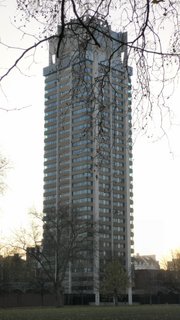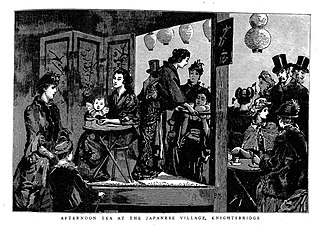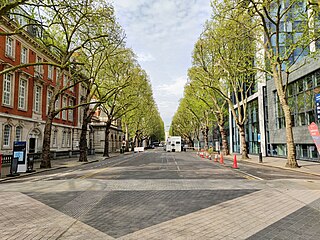
Westminster is an area of Central London, part of the wider City of Westminster.

Kensington is a district in the Royal Borough of Kensington and Chelsea in the West of Central London.

The Royal Borough of Kensington and Chelsea is an Inner London borough with royal status. It is the smallest borough in London and the second smallest district in England; it is one of the most densely populated administrative regions in the United Kingdom. It includes affluent areas such as Notting Hill, Kensington, South Kensington, Chelsea, and Knightsbridge.

Knightsbridge is a residential and retail district in central London, south of Hyde Park. It is identified in the London Plan as one of two international retail centres in London, alongside the West End.

Kensington Gardens, once the private gardens of Kensington Palace, are among the Royal Parks of London. The gardens are shared by the City of Westminster and the Royal Borough of Kensington and Chelsea and sit immediately to the west of Hyde Park, in western central London. The gardens cover an area of 107 hectares. The open spaces of Kensington Gardens, Hyde Park, Green Park, and St. James's Park together form an almost continuous "green lung" in the heart of London. Kensington Gardens are Grade I listed on the Register of Historic Parks and Gardens.

The Westbourne or Kilburn is a culverted small River Thames tributary in London, rising in Hampstead and Brondesbury Park and which as a drain unites and flows southward through Kilburn and Bayswater to skirt underneath the east of Hyde Park's Serpentine lake then through central Chelsea under Sloane Square. It passes centrally under the south side of Royal Hospital Chelsea's Ranelagh Gardens before discharging into Inner London's old-fashioned, but grandiose combined sewer system, with exceptional discharges into the Inner London Tideway. Since the latter 19th century, the population of its catchment has risen further but to reduce the toll it places on the Beckton Sewage Treatment Works and related bills its narrow basin has been assisted by private soakaways, and public surface water drains. Its depression has been replaced with and adopted as a reliable route for a gravity combined sewer. The formation of the Serpentine relied on the water, a lake with a long, ornate footbridge and various activities associated, which today uses little-polluted water from a great depth.

South Kensington is a district just west of Central London in the Royal Borough of Kensington and Chelsea. Historically it settled on part of the scattered Middlesex village of Brompton. Its name was supplanted with the advent of the railways in the late 19th century and the opening and naming of local tube stations. The area is known as a popular tourist destination owing to the density of museums and cultural landmarks. Adjacent affluent centres such as Knightsbridge, Chelsea and Kensington, have been considered as some of the most exclusive real estate in the world. Since the First World War it has become a cosmopolitan area attracting Belgian and French refugees, but also Poles during the Second World War and after, and latterly Spanish, Italian, American, and Middle-Eastern expatriates. The French presence is emphasised by the Lycée Français Charles de Gaulle, the French Institute, hosting the Ciné Lumière a window on French cinema and the Alliance française and the French consulate, among other diplomatic residences. With a French bookshop and many international cafés in the area, it has been called Paris’s 21st arrondissement.

Kensington Road is a section of road in the Royal Borough of Kensington and Chelsea and the City of Westminster, London, forming part of the A315 road. It runs along the south edge of Kensington Gardens and Hyde Park. To the west it becomes Kensington High Street, to the east it becomes Knightsbridge, while Kensington Gore is the name applied to the middle section. To the north is Kensington Palace and to the south, the road is joined by Palace Gate, Queen's Gate, Exhibition Road, and Rutland Gate.

Cities of London and Westminster is a constituency returning a single Member of Parliament (MP) to the House of Commons in the United Kingdom Parliament. It is a borough constituency for the purposes of election expenses and type of returning officer. As with all constituencies, the election is decided using the first past the post system of election. Since its creation at the 1950 general election, the constituency has always elected the candidate nominated by the Conservative Party.

The Hyde Park Barracks are in Knightsbridge in central London, on the southern edge of Hyde Park. They were often known as Knightsbridge Barracks and this name is still sometimes used informally. The barracks are 3⁄4 mile (1.2 km) from Buckingham Palace, enabling the officers and soldiers of the Household Cavalry to be available to respond speedily to any emergency at the Palace, practice drills at Horse Guards Parade or beyond and conduct other more ceremonial duties.
Brompton, sometimes called Old Brompton, survives in name as a ward in the Royal Borough of Kensington and Chelsea in London. Until the latter half of the 19th century it was a scattered village made up mostly of market gardens in the county of Middlesex. It lay south-east of the village of Kensington, abutting the parish of St Margaret's, Westminster at the hamlet of Knightsbridge to the north-east, with Little Chelsea to the south. It was bisected by the Fulham Turnpike, the main road westward out of London to the ancient parish of Fulham and on to Putney and Surrey. It saw its first parish church, Holy Trinity Brompton, only in 1829. Today the village has been comprehensively eclipsed by segmentation due principally to railway development culminating in London Underground lines, and its imposition of station names, including Knightsbridge, South Kensington and Gloucester Road as the names of stops during accelerated urbanisation, but lacking any cogent reference to local history and usage or distinctions from neighbouring settlements.

Queen's Gate is a street in South Kensington, London, England. It runs south from Kensington Gardens' Queen's Gate to Old Brompton Road, intersecting Cromwell Road.

The Japanese Village in Knightsbridge, London, was a late Victorian era exhibition of Japanese culture located in Humphreys' Hall, which took place from January 1885 until June 1887. The exhibition employed around 100 Japanese men and women in a setting built to resemble a traditional Japanese village.

The Westminster Synagogue is a non-affiliated Jewish Reform synagogue and congregation near Hyde Park, London. It is located in Kent House, a restored Victorian town house in Knightsbridge. The building, which dates from the late 1800s, also houses the Czech Memorial Scrolls Centre.

Trevor Square is an elongated garden square in Knightsbridge, London. It was designed in the 1810s chiefly by architect William Fuller Pocock, and the mid-rise, basemented houses fronting its two long sides, with slate mansard roofs are listed in the British protective and recognising scheme, and were built in the 1820s. The main stonemason employed was Lancelot Edward Wood after whom is named neighbouring street Lancelot Place.

Imperial College Road is a tree-lined road in South Kensington, London, England. It runs east–west with Queen's Gate to the west and Exhibition Road to the east.

Bowater House was a 17-floor office block at 68 Knightsbridge in London SW1, completed in 1958. The building occupied a site between Knightsbridge and South Carriage Road, at the southern edge of Hyde Park. It was demolished in 2006 and redeveloped by Candy & Candy to create One Hyde Park.
















